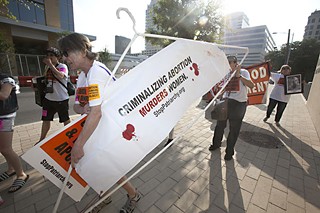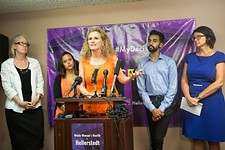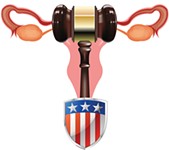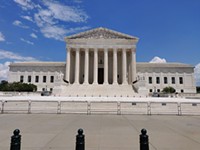'We Won't Back Down': HB 2 on Trial
Abortion clinics fight to stay open
By Mary Tuma, Fri., Aug. 8, 2014

In day two of the trial to block provisions of Texas' abortion-restrictive House Bill 2, a local reproductive health care provider recounted the increased state regulator visits following her involvement with the first lawsuit against HB 2, filed in 2013. Amy Hagstrom Miller, founder and CEO of Whole Woman's Health, testified Tuesday that before her network of health clinics filed suit last year, clinic deficiencies reported by the state were rare. But after filing the suit, the clinics felt a "very significant" change in tone from the Department of State Health Services, which began to aggressively make more visits. Miller said that after her legal complaint to the state, the relationship with DSHS felt "adversarial," and she and her staff grew "uncomfortable."
Miller also detailed the difficulty of leasing or purchasing an ambulatory surgical center due to high cost and uncooperative financiers, while efforts to lease a space close to Seton Medical Center in Austin, failed due to a clause in the lease barring abortions from being performed on the site. Miller's Austin abortion and preventative health care center closed its doors last week after more than a decade in service; two more of her clinics also closed earlier this year as a result of HB 2.
The court also heard from Marilyn Eldridge, president of the now-closed Reproductive Services of El Paso. After more than four decades serving women, the center was forced to close as a result of HB 2's hospital admitting privileges requirement, which mandates doctors acquire admitting privileges at a hospital within 30 miles of where any abortion is performed.
The trial began Monday morning in U.S. District Judge Lee Yeakel's Austin courtroom. Abortion providers and a string of expert witnesses detailed the health and safety risks the law would impose on Texas women, while the state argued the legislation is intended to increase the level of care and patient oversight.
Abortion providers aim to block both the admitting-privileges requirement, and a provision that forces abortion clinics to comply with the same standards as ambulatory surgical centers – an action which is expected to close at least 14 clinics, reducing the total number of remaining abortion care centers in the state to fewer than 10. Only 22% of abortions are performed at ASCs, and most clinics cannot meet the requirements due to exorbitant costs, said attorneys representing abortion providers. For instance, each clinic would need to pay up to an estimated $3 million in construction costs to comply, and between $600,000 and $1 million in annual operating costs for facility changes, a building architect testified – changes considered by health professionals as wholly medically unnecessary.
Dr. Lendol Davis of the Killeen Women's Health Center said his facility had to close because it could not meet the expensive ASC requirement. "These costs are not only enormous, but they provide no benefit to women seeking abortion services in Texas," said Jan Soifer, an attorney representing providers. Following full implementation, abortion care is expected to be limited to San Antonio, Dallas, Fort Worth, Austin, and Houston after September.
More than 891,000 women would live farther than 150 miles from an abortion clinic if the law does take effect, health leaders argued. This, in turn, will likely lead to an increase in abortion procedure delays – which heightens risk and complications for women – including unplanned births, possible self-induction, and use of "black market" abortion pharmaceutical drugs.
Health leaders and plaintiffs argue the hospital-privileges rule isn't needed, as instances of complication are rare and seldom require hospitalization. (In the past 10 years, only two patients of the 14,000 served at the McAllen abortion clinic required transfer from the clinic to a hospital.) The American Medical Association, the American College of Obstetricians and Gynecologists, the American College of Surgeons, and other major health groups agree that privileges aren't necessary for outpatient procedures.
The attorney general's office maintains the law reduces the likelihood of complication and improves patient care. And Deputy AG Jimmy Blacklock argued that the driving distance does not pose a "substantial obstacle." Pointing to the closed El Paso clinic, the state's attorneys argued that women seeking abortion would have "no trouble at all" obtaining the procedure in neighboring New Mexico, 10-15 miles away.
Outside the federal courthouse, both reproductive rights and anti-choice activists gathered to protest. "We're here to show our support for providers and be a visible presence to demonstrate that Texans are fighting back, that we care about what happens to people when they can't access abortion, and to show that we won't back down," said NARAL Pro-Choice Texas Executive Director Heather Busby. The trial is expected to continue throughout the week.
Testimony in the federal trial challenging HB 2 is expected to conclude Thursday or Friday, August 7 or 8. Mary Tuma has been filing reports daily on the Newsdesk at austinchronicle.com.
Got something to say on the subject? Send a letter to the editor.
Read more of the Chronicle's decades of reproductive rights reporting here.










